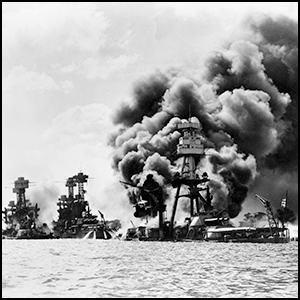
As the year (and the current administration) draws to an end, there has not been much news on the export front. Â So, I’m using today, which is Pearl Harbor Day, to raise the question as to whether U.S. sanctions on Japan for its aggression in China were effective at anything other than forcing the Japanese to attack the United States. Â Economic sanctions are usually seen as a diplomatic alternative short of war without remembering that, at least on one occasion, many think economic sanctions may have precipitated war.
In 1939 the United States, concerned about Japanese aggression in China, terminated the 1911 commercial treaty with Japan, which laid the groundwork for cutting of exports to Japan. On July 31, under the authority of the Export Control Act passed earlier that month, exports of fuels, lubricant, certain metals  to Japan were prohibited.   Effective October 16 of that year, exports of scrap iron and steel to Japan were cut off.  Finally, on July 26, 1941, Roosevelt, utilizing the provisions of the Trading with the Enemy Act, froze all Japanese assets in the United States.
These actions had a significant impact on Japan.  An intercepted and decrypted cable between Foreign Minister Teijiro Toyoda  to Ambassador Kichisaburo Nomura on July 31 said this:
Commercial and economic relations between Japan and third countries, led by England and the United States, are gradually becoming so horribly strained that we cannot endure it much longer. Consequently, our Empire, to save its very life, must take measures to secure the raw materials of the South Seas.
The economic impact of the embargo forced Japan to seize the missing resources and the U.S. naval presence in the Pacific was seen by them as something that could hinder that.  That is the germ of the argument that in the case of Japan sanctions may have provoked war rather than deterred it.
Here’s an article with an opposite view. Â It argues that Japanese aggression caused the sanctions.
I think the truth is somewhere in the middle of these two arguments. Sanctions alone did not force Japan to war. It was probably headed down that road prior to the imposition of economic sanctions. But it certainly was a factor that increased the chance of war and accelerated its onset.

 Posted by
Posted by  Category:
Category: 

![Great Wall of China Wide by Nate Merrill [CC-BY-SA-2.0 (http://creativecommons.org/licenses/by-sa/2.0)], via Flickr https://flic.kr/p/dXBy8h [cropped] Great Wall of China Wide by Nate Merrill [CC-BY-SA-2.0 (http://creativecommons.org/licenses/by-sa/2.0)], via Flickr https://flic.kr/p/dXBy8h [cropped]](https://www.exportlawblog.com/images/great_wall.jpg)


